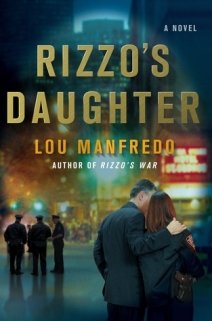Rizzo’s Daughter by Lou Manfredo
by Orual
Book Description
Brooklyn cop Joe Rizzo—“the most authentic cop in contemporary crime fiction” (starred review Kirkus Reviews)—is ready to retire and spend the rest of his days with his wife, doting on their grown-up girls. But when his youngest daughter, Carol, decides to follow her dad onto the force, Joe decides to stay on until she’s settled, calling in favors to get her assigned to the easiest house, the best training officer—anything to protect his baby girl.
While there, of course, he’s still working a few cases, though he never would’ve guessed that one of them would be the most sensational case of his career, the murder of mob boss Louie Quattropa. If mob wars were the worst of his problems, he could handle that, but with a daughter on patrol, Joe knows all too well what dangers await her and what little he can do about them.
With an authentic voice and breathtakingly accurate portrayal of police work, Lou Manfredo’s novels have won wide acclaim, and Rizzo’s Daughter raises the bar to a whole new level.
Book Review
There are two things I wish I had known before beginning this book:
1) This is the third installment in the “Rizzo” series of novels by Lou Manfredo. It stands on its own pretty well, but I think it might help to understand Rizzo’s character arc by reading the first two books. (I did try to read the first book, Rizzo’s War, but I found the prose to be completely unreadable. More on that in a bit.)
2) This, along with the other Rizzo novels, is a “police procedural”. This means that, instead of focusing on the solving of one crime like most detective novels, it attempts to accurately depict the daily activities of police offers as they work many different cases.
As a procedural, I think this book works pretty well. It follows an older detective (Rizzo) as well as a complete rookie (the titular daughter), so you get a taste of the different kinds of cases each might work. I don’t doubt that this aspect of the novel is fairly realistic, and for those who enjoy reading just this kind of detective novel, it won’t disappoint. Personally, I think the sort of “patchwork” quality of this book means it lacks a driving and cohesive storyline. The book flows along well enough (after the 70pgs it took for me to get into it), but I felt zero urgency in the story. I don’t know if it’s typical of procedurals or not, but there was no build-up or climax for me.
Of course, plenty of novels lack the “rising-action>falling-action” form. Most literary novels are like that, probably. But literary novels usually offer something else instead, namely character and style. And in these two areas, Rizzo’s Daughter doesn’t excel.
Like I said before, I think one would probably get a much better hold on the character of Rizzo by reading the novels in order. But I didn’t. I only read this one, and what stuck out to me most is that other characters kept talking about how tough and cold and dangerous Joe Rizzo can be. But I never really saw it in the character himself. I don’t wanna hear about it; I wanna see it. (And since I was originally interested in this book because I thought it was about the mafia, I would like to have seen a mob boss with some actual menace.) Also, the female characters are very, very thin (characterization-wise).
Now, the reason I didn’t read the first two books is because the first one, Rizzo’s War, is just terribly written: lots of over-writing, excessive adverbs, descriptions of people’s eyes, etc. The dialogue is stilted and doesn’t represent how people really talk at all. Basically, it has all the hallmarks of a person who worked in the field (criminal justice) and then decided they want to be a writer of police fiction, talent be damned. And there are still some problems with the writing in Rizzo’s Daughter. Manfredo still packs his dialogue with a lot of exposition that he obviously wants the reader to know but can’t figure out how else to work in. He still uses adverbs. And a couple of his sentences just struck me as terrible (“the couple laughed into each other’s eyes”). BUT! On the whole, the prose in this book is a HUGE improvement over Rizzo’s War, and for that, I am giving this book an extra star.
Disclaimer: I received a free advance copy of this book from the publisher.

